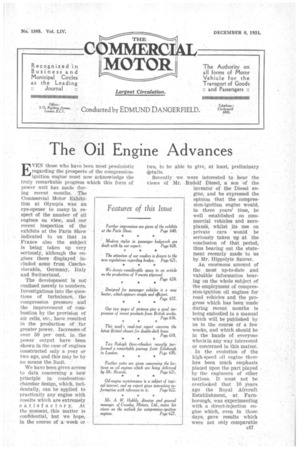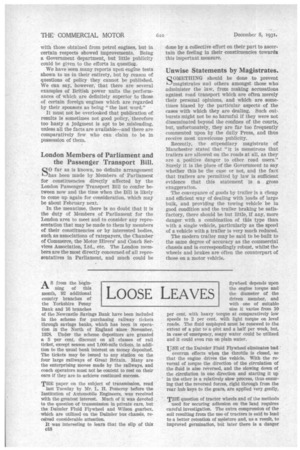The Oil Engine Advances
Page 39

Page 40

If you've noticed an error in this article please click here to report it so we can fix it.
EYEN those, who have been most pessimistic regarding the Prospects of the compressionignition engine must now acknowledge the truly remarkable progress which' this form of power unit has made dur ing recent months. . The Commercial Motor Exhibi tion at Olympia was an eye-opener to many in respect of the number of oil engines on view, and our recent inspection of the exhibits at the Paris Show indicated to us that in France also the subject is being taken up very seriously, although the engines there displayed included some from Czechoslovakia, Germany, Italy and Switzerland.
The development is not confined merely to numbers. Investigations into the questions of turbulence, the compression pressure and the improvement of combustion by the provision of air cells, etc., have resulted in the production of far greater power. Increases of over 50 per cent. in the power output have been shown in the case of engines constructed only a year or two ago, and this may be by no means the limit.
We have been given access to data concerning a new principle in combustionchamber design, which, incidentally, can be applied to practically any engine with results which are extremely satisfactory. At the moment, this matter is confidential, but we hope, in the course of a 'week or two, to be able to give, at least, preliminary details.
Recently we were interested to hear the views of Mr. Rudolf Diesel, a on of the inventor of the Diesel en gine, and he expressed the opinion that the cornpression-ignition engine would, in three years' time, be well established on commercial vehicles and aeroplandS, whilst its use on private cars would be seriously taken up at the conclusion of that period, thus bearing out the statement recently made to us by Mr. Hippolyte Sourer.
An enormous amount of the most up-to-date and valuable information bearing on the whole subject of the employment of compression-ignition oil engines for road vehicles and the progress which has been made during recent months is being embodied in a manual which will be published by us in the course of a few weeks, and which should be in the hands of everyone who is in any way interested or concerned in this matter. In the evolution of the high-speed oil engine there has been much emphasis plimed upon the part played by the engineers of other nations. It must not be overlooked that 10 Years ago the Royal Aircraft Establishment, at Farnborough, was experimenting with a direct-injection engine which, even in those days, gave results which were not only comparable with those obtained from petrol engines, but in certain respects showed improvements. Being a Government department, but little publicity could be given to the efforts in questio.v.
We have seen many reports upon engine tests shown to us in their entirety, but by reason of questions of policy they cannot be published. We can say, however, that there are several examples of British power units the performances of which are definitely superior to those of certain foreign engines which are regarded by their sponsors as being "the last word."
It must not be overlooked that publication of results is sometimes not good policy, therefore too hasty a judgment is apt to be misleading, unless all the facts are available—and there are comparatively few who can claim to be in possession of them.
London Members of Parliament and the Passenger Transport Bill.
S°far as is known, no definite arrangement has been made by Members of Parliament for constituencies directly affected by the London Passenger Transport Bill to confer between now and the time when the Bill is likely to come up again for consideration, which may be about February next.
In the meantime, there is no doubt that it is the duty of Members of Parliament for the London area to meet and to consider any representation that may be made to them by members of their constituencies or by interested bodies, such as associations of ratepayers, the Chamber of Commerce, the Motor Hirers' and Coach Services Association, Ltd., etc. The London members are the most directly concerned of all representatives in Parliament, and much could be done by a collective effort on their part to ascertain the feeling in their constituencies towards this important measure.
Unwise Statements by Magistrates.
SOMETHING should be done to prevent magistrates and others amongst those who administer the law, from making accusations against road transport which are often merely their personal opinions, and which are sometimes biased by the partiCular aspects of the cases with which they are dealing. Such outbursts might not be so harmful if they were not disseminated beyond the confines of the courts, but, unfortunately, they are far too frequently commented upon by the daily Press, and thus receive most unwelcome publicity.
Recently, the stipendiary magistrate of Manchester stated that "it is monstrous that trailers are allowed on the roads at all, as they are a positive danger to other road users." Surely it is the place of the Government to say whether this be the case or not, and the fact that trailers are permitted by law is sufficient evidence that this statement is a gross exaggeration.
The conveyance of goods by trailer is a cheap and efficient way of dealing with loads of large bulk, and providing the towing vehicle be in good condition and the trailer braking be satisfactory, there should be but little, if any, more danger with a combination of this type than with a single vehicle, particularly as the speed of a vehicle with a trailer is very much reduced.
The modern trailer may be said to be built to the same degree of accuracy as the commercial chassis and is correspondingly robust, whilst the wheels and brakes are often the counterpart of those on a motor vehicle.














































































































